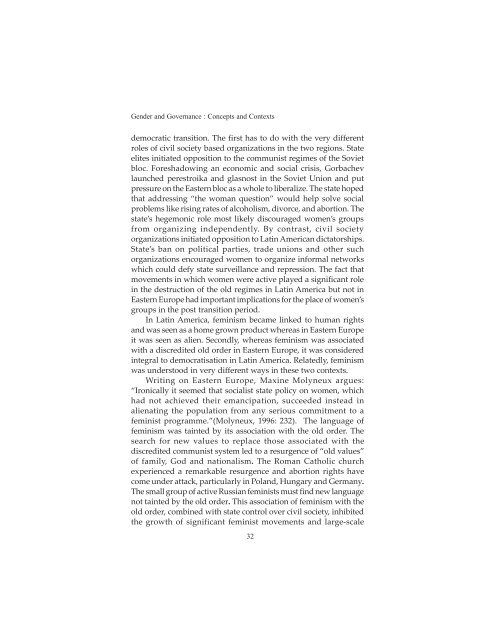Essays On Gender And Governance - United Nations Development ...
Essays On Gender And Governance - United Nations Development ...
Essays On Gender And Governance - United Nations Development ...
Create successful ePaper yourself
Turn your PDF publications into a flip-book with our unique Google optimized e-Paper software.
<strong>Gender</strong> and <strong>Governance</strong> : Concepts and Contexts<br />
democratic transition. The first has to do with the very different<br />
roles of civil society based organizations in the two regions. State<br />
elites initiated opposition to the communist regimes of the Soviet<br />
bloc. Foreshadowing an economic and social crisis, Gorbachev<br />
launched perestroika and glasnost in the Soviet Union and put<br />
pressure on the Eastern bloc as a whole to liberalize. The state hoped<br />
that addressing “the woman question” would help solve social<br />
problems like rising rates of alcoholism, divorce, and abortion. The<br />
state’s hegemonic role most likely discouraged women’s groups<br />
from organizing independently. By contrast, civil society<br />
organizations initiated opposition to Latin American dictatorships.<br />
State’s ban on political parties, trade unions and other such<br />
organizations encouraged women to organize informal networks<br />
which could defy state surveillance and repression. The fact that<br />
movements in which women were active played a significant role<br />
in the destruction of the old regimes in Latin America but not in<br />
Eastern Europe had important implications for the place of women’s<br />
groups in the post transition period.<br />
In Latin America, feminism became linked to human rights<br />
and was seen as a home grown product whereas in Eastern Europe<br />
it was seen as alien. Secondly, whereas feminism was associated<br />
with a discredited old order in Eastern Europe, it was considered<br />
integral to democratisation in Latin America. Relatedly, feminism<br />
was understood in very different ways in these two contexts.<br />
Writing on Eastern Europe, Maxine Molyneux argues:<br />
“Ironically it seemed that socialist state policy on women, which<br />
had not achieved their emancipation, succeeded instead in<br />
alienating the population from any serious commitment to a<br />
feminist programme.”(Molyneux, 1996: 232). The language of<br />
feminism was tainted by its association with the old order. The<br />
search for new values to replace those associated with the<br />
discredited communist system led to a resurgence of “old values”<br />
of family, God and nationalism. The Roman Catholic church<br />
experienced a remarkable resurgence and abortion rights have<br />
come under attack, particularly in Poland, Hungary and Germany.<br />
The small group of active Russian feminists must find new language<br />
not tainted by the old order. This association of feminism with the<br />
old order, combined with state control over civil society, inhibited<br />
the growth of significant feminist movements and large-scale<br />
32

















